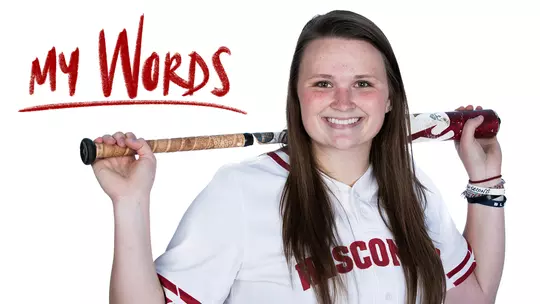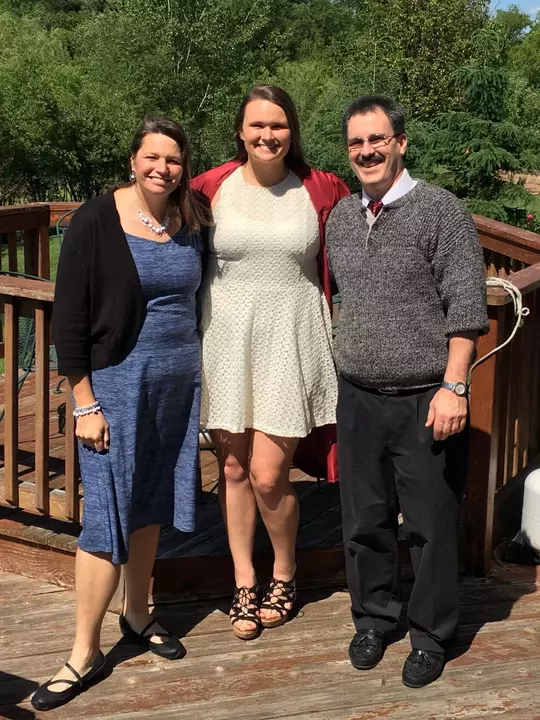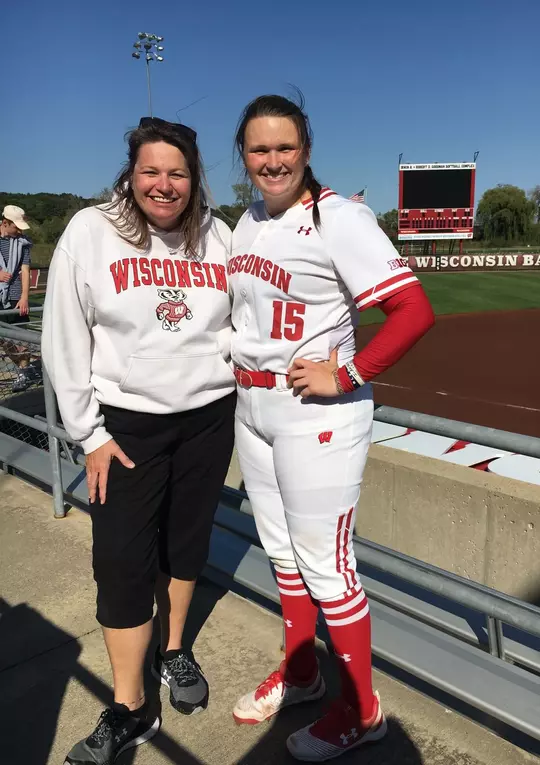
My Words: I Am Enough
By Kayla Konwent, Softball
5/20/2022
I believe in miracles because I’m certain I’ve experienced one.
I was told more than once that my time with the Wisconsin softball program was done before it ever really got started. Doctors looked at the various MRIs of my right shoulder and declared that it was medically unlikely for me to continue playing the sport that I fell in love with when I was 8.
I knew I was hurt when I couldn’t grip the ball, much less throw it, and the pain wouldn’t go away. I wound up having surgeries 22 months apart, one to repair a torn labrum and another to reattach the biceps tendon to the humerus bone. After the second procedure it was unlikely I’d ever be able to compete at the level I did before, especially when it came to throwing. I played in only 13 of 104 games for the Badgers up to that point. Needless to say, it was not how I thought my time as a UW student-athlete would go.
I had come to Madison with high expectations for myself. I wanted to be the best player Wisconsin had ever seen and become an All-American. I was thinking big.
Then I got hurt. Those two years were probably the hardest of my life because I thought my whole world was softball and I didn’t know what to do when that wasn’t there anymore.
Turns out, God had a plan for me. It included a miracle that served to reinforce my faith in that plan.
Four years later, I’m still playing for the Badgers. I’ve broken records, been named an All-American and experienced a lot of personal fulfillment on and off the field. I’m healthy. I have a degree in retail and consumer behavior and I’m working toward my master’s in education, leadership and policy analysis focusing on sports leadership. But I wouldn’t have achieved and appreciated those accomplishments as much – wouldn’t have looked inward and grown to the degree I have – had I not faced the adversity I did at the start of my UW career.
When sports take up every waking minute of your life, they become your identity. When you get hurt, that identity is stripped away from you. You have to figure out what you’re all about and that’s not an easy process. I was lucky that it happened to me when it did. Most student-athletes experience that uncomfortable void when they’re done with school and the supportive resources might not be there.
When you’re not playing due to injury, it can affect relationships with teammates and coaches in a negative way. However, that was not my experience. We have a support group for UW student-athletes who are injured and that was an immense help to me. My coaches did an incredible job of having my back and keeping me involved in any capacity I could. My teammates came beside me in hundreds of ways, inviting me to their apartment, getting coffee or a meal. I can’t begin to say thank you enough to my athletic trainer, Ashley Parr, for all she’s done for me. They all genuinely cared for me, not just my injury. That’s how I learned how tremendous the Wisconsin softball program is and why so many of my fellow student-athletes move on from here as a well-rounded person.
I am a completely changed woman compared to when I came in. That’s being said in a good way. My biggest takeaway is that softball is something I play. It’s not who I am.
We have a support group for UW student-athletes who are injured and that was an immense help to me. That’s how I learned how tremendous the Wisconsin softball program is and why so many of my fellow student-athletes move on from here as a well-rounded person.Kayla Konwent
Not many people can say their college experience is like mine.
I missed two-thirds of my freshman season in 2017 due to the torn labrum, then sat out all of my sophomore year in 2018 following the biceps surgery.
I’ll never forget my junior season in 2019 because we had a great team and I finally got a chance to show everyone what I could do when healthy. We won 43 of 57 games and almost knocked the No. 1 team in the country out of the NCAA tournament. I played in every game and wound up being chosen the Big Ten Player of the Year and a first-team All-American.
My senior year brought on another injury. The ligament that holds the right kneecap in place had stretched to the point that the cap would slide out of place. When the 2020 season was canceled due to the pandemic, I had surgery that prevented me from bending the leg for what seemed like months. Once again, doctors told me my softball career was over – but this time it seemed much more serious.
I was eligible to play in 2021, but given the serious nature of COVID-19 and the fact that my father, Tom, and I are both immuno-compromised, I took a year off from school. The way my body was feeling, it was easy to shut things down. I would not be playing at the capacity I am this season had I not taken the year off. I haven’t felt this healthy since high school.
It might sound crazy, but I have another year of eligibility available if I want to use it. I’m 24, which already makes me six years older than some of the freshmen. They’ll make jokes about me being old, and that’s cool. It’s warranted. I’ll mention that I’m sore, and they’ll say, “Yeah, because you’re 40.”
I’m excited about what could be next for me. I have thought about playing for the Badgers in 2023, but I’ll wait until this season is over before I ponder the pros and cons.


One of the reasons I love softball so much is the constant array of challenges it presents. Every at-bat. Every pitch. Every inning. Every game. You have to deal with a lot of failure. There are times when the pitcher might just be better than me. In those moments I try to be grateful for them showing me something that I wouldn’t have figured out otherwise had they not struck me out three times.
But one solid swing is all it takes to make you feel good about yourself. All you have to do is be better than the pitcher one time. When that happens and the hit is a home run, the sensation is incredible. You feel it right away. I think the better feeling is coming around the bases and hearing people cheer for you and seeing your teammates excited and enjoying the moment. When I round second base, I always look to the stands and give my mother, Cheryl, a thumbs-up. There’s no better feeling than celebrating with the ones who helped you get to that moment. It’s pure, 100-percent genuine, joy.
The sensation can be even more intense when you see a teammate hit one out. When our catcher, Christaana Angelopulos, hit two home runs against Indiana earlier this season, I cried because I see how hard she works every day and I was waiting for that breakthrough moment for her.
One thing I would change about softball is the intentional walks. I feel like when you tell your pitcher to intentionally walk me, you’re telling your pitcher you have no confidence in them to get the job done. If I were the coach, I would throw stretch lanes and nibble at the corners to try and get me to chase – which further illustrates my confidence in them and says we're not backing down on anyone. I have a lot of respect for pitchers who challenge me and try to get me out. Trust me, I’ve been known to get impatient and swing at pitches off the plate. Failure goes both ways.

When I round second base, I always look to the stands and give my mother, Cheryl, a thumbs-up. There’s no better feeling than celebrating with the ones who helped you get to that moment. It’s pure, 100-percent genuine, joy.
One of the most important choices I made during my time at Wisconsin was to cultivate a relationship with God through an association with Athletes in Action. I learned that He’s going to love me if I strike out or if I hit a home run. It’s very freeing.
My worth comes from what God says of me. I know not everyone is into that, but it’s so applicable in so many aspects of my life. When I realized that my identity was what God had to say about me versus what society had to say about me, it was a life-changer. Before every at-bat, I say, “In Christ, I am enough.’’ That gives me the confidence to go into my next at-bat thinking that whatever I do, I will be grateful and fulfilled.
Somebody asked me recently if I felt cheated given all the time I spent away from softball during my UW career. My answer: Not at all. Everything happens for a reason. Had my experience not gone the way it did, I wouldn’t be the person I am today.
I’m sustained by a sense of appreciation for what God has done in my life. Gratitude is the only attitude you can have if you don’t want to be consumed by your negative thoughts. I’ll never be able to adequately express my thanks to all the people – family, friends, teammates, coaches – who’ve helped me in this life.
During my gap year away from UW, I began working as a youth coach at Ethic Sports Academy in New Berlin, which is not far from my family’s home in Salem. I don’t know where I’ll be five years from now, but I think I want to be the change I want to see in coaching.
Working with these girls, I want them to know that their love of the game can’t be dependent on what the coach thinks of them or their performance. Relationships with your teammates, that’s what makes the difference.
I fear that we’re forgetting why we fall in love with our sport in the first place. I went into coaching to share my love of the girls and the game. I prayed about having my leadership skills refined so that I would be able to share with people that their worth as a person doesn’t come from what happens on a softball diamond. It comes from the relationships they build.
I vividly remember my freshman year with the Badgers. I wanted to make everyone happy. I wanted everyone to be proud of me. That can be suffocating. A lot of people get stuck there. You need good people around you to help you get out of it. Luckily, I have a caring culture at UW and AIA and great teammates who have helped me through this. It’s so important to invest in the athlete holistically and not just in their athletic performance. You need to know that your coach still loves you and can celebrate the things about you that you bring to the table even when we lose. You need to know that they’re going to help you find a way to be better.
I’m still trying to figure out what I’m going to do with my life, but I think the coaching world needs more people who care about softball players as humans, not commodities.
I give coaches a lot of credit for all the hours and thought that they invest in their athletes. But I believe that too many of them view winning as the over-arching theme. It’s not. It’s about relationships. It’s about building up, not tearing down. When you have a relationship with those who you are coaching, they will run through a wall for you. Because they understand that the coach doesn't just care about me when I hit a homerun, but they also care about school, my family and my other interests.
Sometimes it’s something as simple as checking in to see how an athlete is doing. How they’re REALLY doing. That makes someone feel cared-for. How do I make sure my athletes feel cared about as a person and how will I make them feel empowered as a person with access to the resources that they might need?
It’s been hard for me to concentrate the last couple weeks. Not long after a fellow UW student-athlete took her own life, a softball player at James Madison did so as well. I didn’t know Sarah or Lauren personally, but their lives were so much more than their sports. They were daughters. They were best friends. They were teammates. They were role models. They offered this world so much.
But they were also in pain, and I truly get that. Being a student- athlete is hard. It is just so sad that some feel that is their only choice, they simply can’t handle it anymore. And some people never get a chance to see how loved they are or how much they are worth when sport dictates so much of their life.
I think we should use this moment to think long and hard about priorities and transparency. To think about the importance of self-care and of mental health for student-athletes.
We don’t need miracles. Just action.







